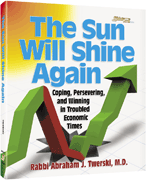Rabbi Dr. Abraham J. TwerskiMaintaining Equilibrium Under Stress
Just when it seems that the economic crisis cannot get any worse, whammo! We are hit by another salvo. Even people who still have their jobs and who have not lost their investments have been affected. In addition to the actual economic losses, there has been widespread depression, in which some people whose self-esteem was largely based on their ability to earn and provide have had a loss of self-worth.
Rabbi Chaim Shmulevitz cites the midrash about King Solomon, who was thrown off his throne by Ashmidai, king of the demons. Solomon went begging from door to door for food, and when he said "I am the king," people jeered at him as a madman. The Talmud says that initially, Solomon was a powerful monarch, king over a vast empire, the greatest of the great, and when he was thrown off his throne and had to beg for food, he was "king only over his walking stick" (Sanhedrin 20b). Rabbi Shmulevitz says that in the depth of his impoverishment, Solomon was still "king over his walking stick," i.e., he never forgot that he was king. His circumstances were disastrous, but he did not allow them to crush him. He maintained his sense of royalty even when he had to beg for food.
Listen to Rabbi Shmulevitz's words: "A person must be most cautious when he suffers a fall, that he should not allow the fall to harm him even more than the actual adverse circumstances. If he will strengthen himself even in his decline and maintain his personal value under all circumstances, there is hope that he will rise and return to his former status and even higher than that" (Sichos Musar 5731:13).
This is a precious Torah insight. Sometimes we cannot control what happens to us, but we can control how we react.
I realize that it is difficult to have bitachon when one has lost one's job and/or one's savings have evaporated. Rav Moshe Teitelbaum, author of Yismach Moshe, received a dowry from his father-in-law, and gave it to someone to invest for him. Unfortunately, the investment failed, and the Yismach Moshe was left destitute, but he continued his Torah study under these difficult circumstances.
One day, as he was studying Torah, the thought occurred to him that if he were somehow able to get a significant sum of money, he would give it to someone more reliable to invest for him, and he would be able to devote himself to Torah study with peace of mind.
As he was thinking this, a deep sleep came over him, and he dreamed that he was in Gan Eden. He walked from one hall to another, until he came to one hall where a tzaddik was teaching Torah. The tzaddik shone brightly, and each word seemed to be aflame.
"Who is this tzaddik?" the Yismach Moshe asked. "That is the holy Ari z"l," he was told. The Yismach Moshe was seized with tremors of awe. Then he heard the tzaddik call to him, "Young man! If a person had ten thousand talents of silver, would he not be dependent on the compassion of Hashem? Inasmuch as a person is always dependent on Hashem, what difference does it make whether one has one gulden or ten thousand gulden?"
It is extremely important not to panic. We may have to make some difficult decisions, and panic can grossly distort our decision-making capacity.
"Hope unto Hashem, be strong and strengthen your heart, and hope unto Hashem" (Psalms 27:14 .) Why the repetition? Because it may be difficult to hope, and one may have to gather strength to be able to hope. If a person finds that he has lost hope, he must try to strengthen his emunah so that he will be able to hope again.
Editor's Note: Rav Twerski expands on this theme in his new book "The Sun Will Shine Again - Coping, Persevering, and Winning in Troubled Economic Times". Copies can be ordered here.
